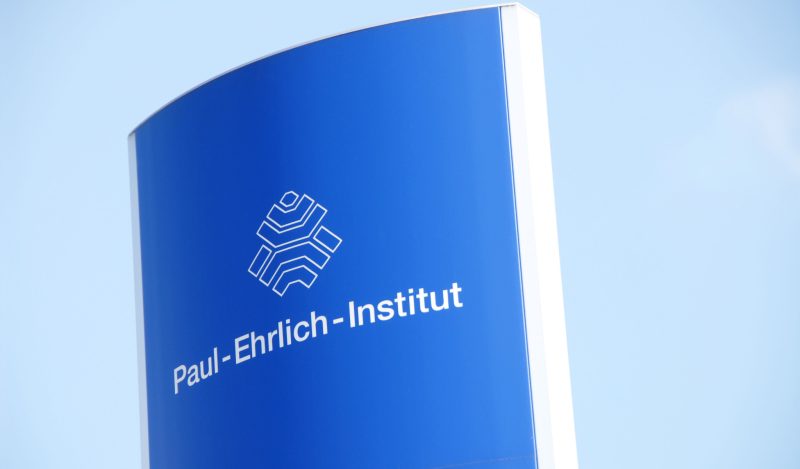Two of the slides used by German chemistry professors Gerald Dyker and Jörg Matysik in their now famous interview on the variable toxicity of different batches of the Pfizer-BioNTech vaccine have been seen around the world: (1) the graph from the Danish study, showing enormous differences in toxicity between ‘blue,’ ‘green,’ and ‘yellow’ batches, and (2) their own table displaying an almost solid column of ‘neins,’ indicating that the responsible regulator, Germany’s Paul Ehrlich Institute (PEI), did not subject the apparently harmless ‘yellow’ batches to quality control testing.
It was the latter discovery – and not the hotly debated Danish study per se – that led Prof. Dyker to conclude that the yellow batches might be ‘something like placebos,’ after all. But the third slide from the interview also deserves to be better known, since it refocuses attention on a crucial aspect of this story which has been almost completely obscured amidst the sound and fury of the attempted “debunkings” of the placebo hypothesis: namely, the relationship between the regulator, the Paul Ehrlich Institute, and the manufacturer, Germany’s BioNTech.
To state the obvious – and this is really all that Prof. Dyker was doing in his supposedly controversial remarks in the interview – the observation that the regulator did not test precisely the apparently harmless batches suggests impropriety: as if it knew in advance that the batches were innocuous and hence did not need quality control. It suggests that the PEI colluded with the manufacturer to place an adulterated product – perhaps indeed, in this case, a pseudo-product – on the market.
It needs to be stressed that the manufacturer here is precisely the German firm BioNTech. BioNTech, not its more well-known American partner Pfizer, is legally the manufacturer of the so-called Pfizer-BioNTech vaccine. Pfizer is a contractor which undertakes (some) manufacturing activities on BioNTech’s behalf. This is invariably indicated on the very label of the vaccine. (See below, for instance, and, for more examples and a discussion, here).
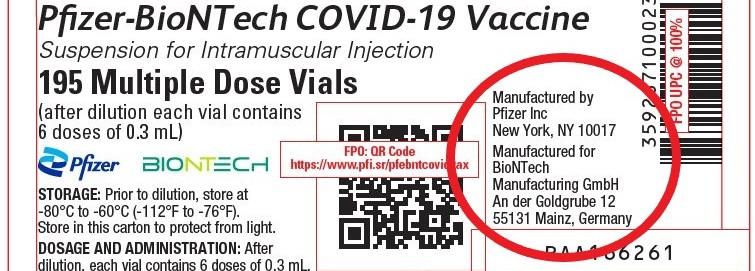

It is important to note that in the EU, BioNTech also directly contributes to the supply chain by manufacturing the active drug substance, i.e. the mRNA, in its own facilities.
Furthermore, BioNTech, not Pfizer, is the marketing authorisation holder for the vaccine in the EU, like in most other markets. Hence, it is the German firm BioNTech which was responsible for providing batch samples to the German regulator, the Paul Ehrlich Institute, as Dyker and Matysik’s interview likewise makes clear.
Let’s have a look now at the professors’ third slide below. It should be recalled that Dyker and Matysik are part of a group of five German-speaking scientists who have been raising questions about the quality and safety of the BioNTech vaccine with both the manufacturer and the PEI.
The slide consists simply of a tweet dated June 6th. The author of the tweet is none other than German Minister of Health Karl Lauterbach. The picture shows Lauterbach at the Paul Ehrlich Institute with PEI president Klaus Cichutek and some lab workers. Lauterbach is the man in the middle of the photo and Cichutek is to the right.
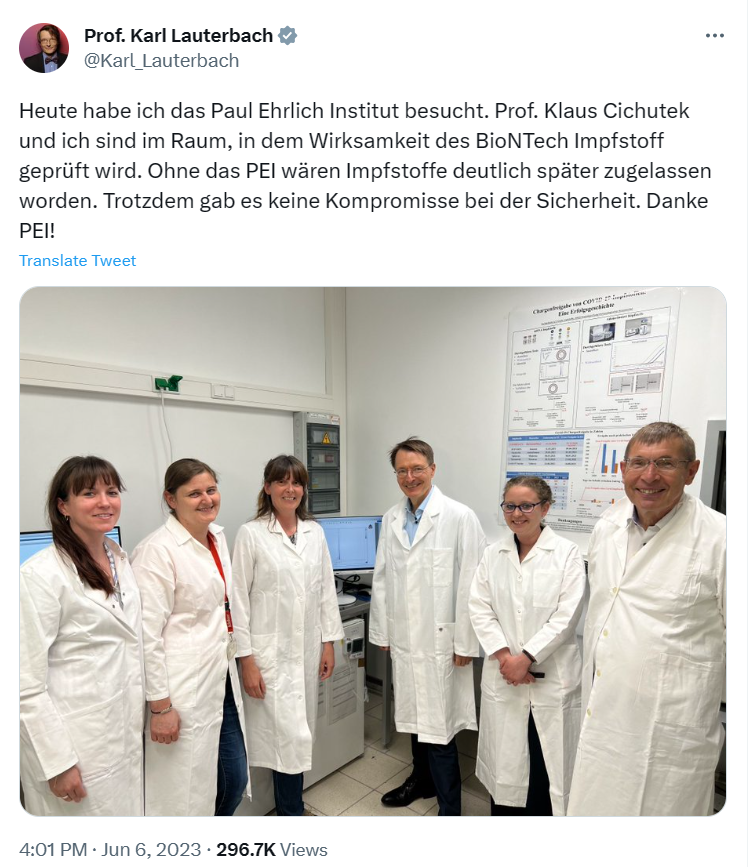

The text reads as follows:
Today, I visited the Paul Ehrlich Institute. Prof. Klaus Cichutek and I are in the room in which the efficacy of the BioNTech vaccine is tested. Without the PEI, vaccines would have been authorised much later. Nonetheless, there was no compromising on safety. Thank you PEI!
In the interview, Prof. Dyker expresses his and his colleagues’ puzzlement about Lauterbach’s assertion that the efficacy of the BioNTech vaccine is tested at the PEI: ‘We have never heard of there being any kind of rapid test of the efficacy of vaccines,’ he says, ‘Normally, that is tested in a clinical trial, after all.’
But, more to the immediate point, he also notes that the poster on the wall behind Lauterbach and Cichutek in the photo is titled ‘Batch Release of Covid-19 Vaccines: A Success Story’ – as if approving the batches for release were the PEI’s purpose and goal. Given the extraordinarily high level of adverse events associated with the blue batches in the Danish study, all of which were approved for release by the Paul Ehrlich Institute, the description of their release as a ‘success story’ is questionable, to say the least.
Moreover, Lauterbach’s comment that ‘Without the PEI, vaccines would have been authorised much later’ casts the PEI in exactly the same role of enabler rather than regulator – even if he hastens to add that ‘Nonetheless, there was no compromising on safety.’
Lauterbach is right. Without the PEI, the authorisation of the Pfizer-BioNTech vaccine would indeed have taken a longer time. But in fact we know that there was precisely compromising on safety: not only because of the horrendous safety data associated with the blue batches of the vaccine – which, perhaps not coincidentally, appear to have been the earliest batches released in the EU – but also because the shortcuts taken by BioNTech with the PEI’s blessing are a matter of public record.
Thus, in a highly unusual arrangement, the PEI allowed BioNTech to initiate clinical (i.e. human) testing of Covid-19 vaccine candidates before a preclinical toxicology study on animals had even been completed, based merely on ‘interim results.’ The details of this arrangement are documented in my article here. As likewise discussed in that article, other categories of more systematic preclinical testing, so-called safety pharmacological studies, were simply skipped altogether.
It should be noted that BioNTech and the PEI took these decisions without the involvement of Pfizer, the American company having only joined BioNTech’s vaccine project for the clinical phase of the authorisation process.
Given the tremendous economic significance of BioNTech’s success for the German economy, one can wonder in general about the wisdom of having the German regulator serve as the regulator responsible for releasing batches to all EU member states. The potential conflict of interest is obvious. BioNTech’s mercurial rise was, for instance, the very motor of Germany’s return to growth in 2021 (as touched upon here), to say nothing of the roughly 30 percent of its profits that the company pays in corporate tax.
But such doubts are even more justified when we consider that the PEI has a longstanding relationship with BioNTech founders Ugur Sahin and Özlem Türeci, which, far from being arm’s-length, has in fact been intimate and collaborative. This is openly acknowledged in The Vaccine, the auto-hagiographical account of the development of the BioNTech vaccine which Sahin and Türeci co-authored along with journalist Joe Miller.
Thus, on p. 45 of The Vaccine, we discover that PEI staff:
…even co-authored scientific papers with mRNA pioneers, including Ugur and Özlem. The couple attended “research retreats” organised by the regulator – essentially workshops during which the frontiers of medical research were discussed in detail. The innovators and the regulators learned about novel technologies, such as mRNA, together.
But it is not only that PEI staff have co-authored papers with Sahin and Türeci. As can be seen below, PEI president Cichutek has himself co-authored a paper – interestingly enough, on the development of a Coronavirus vaccine! – with none other than BioNTech CEO Ugur Sahin.
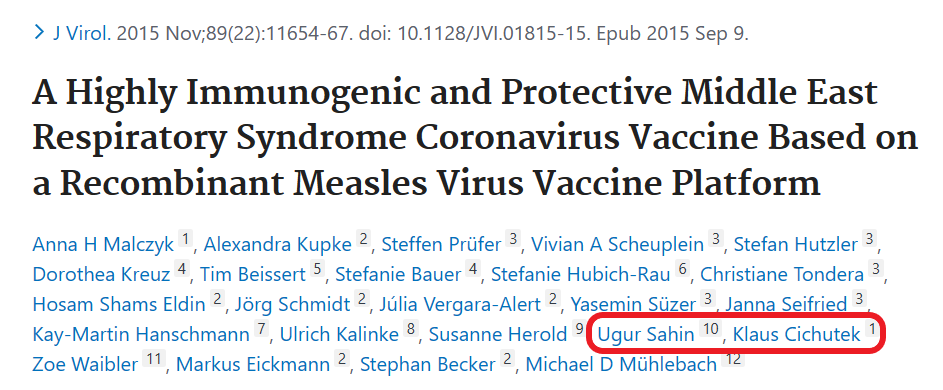

In addition to being president of the PEI, moreover, Cichutek, as can be seen here, is also “Product Development Coordinator” at the publicly-funded German Center for Infection Research (DZIF).
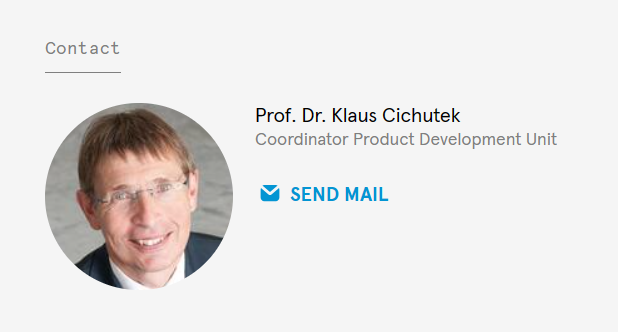

The external partners of the DZIF include none other than BioNTech. The DZIF website notes that:
In collaboration with BioNTech and the biopharmaceutical research institute Translational Oncology at the University of Mainz (TRON), the DZIF is researching RNA-based vaccines for selected virus families with potential human pathogens, and subsequently bringing them into preclinical and early clinical development.
TRON, like BioNTech, was co-founded by Ugur Sahin and Özlem Türeci.
Of course, the PEI could always clear up any suspicions hanging over it due to the missing quality control of the apparently innocuous yellow batches of the Pfizer-BioNTech vaccine. Perhaps there is, after all, an innocent explanation.
But in the Dyker and Matysik interview, Prof. Matysik notes that the last communication which the professors received from the PEI was an official notification that they would not be receiving any further responses to their questions.
(Translations from the German by the author, when not available at the linked source.)
Join the conversation:


Published under a Creative Commons Attribution 4.0 International License
For reprints, please set the canonical link back to the original Brownstone Institute Article and Author.
